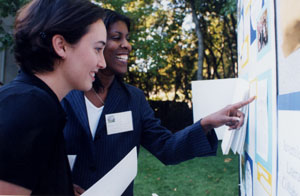|
HOME | SEARCH | ARCHIVE |
|
Town-gown partnerships
Chancellor, Mrs. Berdahl honor standout campus-community collaborations
![]()
By Fernando Quintero, Development Communications
| |  Vicki Benson and Bonita Vinson view a display about the Juvenile Hall Literacy Collaborative, where they work. Peg Skorpinski photo |
27 September 2001
|
At a time when the importance of community has been highlighted in the starkest terms, Chancellor and Mrs. Berdalh paid tribute Sept. 25 to nine programs that bring campus resources to bear on pressing needs of local residents. “Given the events of the past couple of weeks, we appreciate more fully than ever the nature of community,” Berdahl told staff, students, faculty and local service providers at the University and Community Partnerships recognition celebration. “We come together not only in times of crisis, but also to recognize the importance of community,” Berdahl stressed, from the veranda of the historic University House. Guests were entertianed by students from the Young Musicians Program — a university-community partnership that for more than 30 years has provided low-income students with professional musical training. “These partnerships represent the university’s commitment to be truly engaged in the life of the community,” Berdahl said. This year’s reception honored nine partnerships that work in areas including education, youth services, legal assistance and public health. Through unique collaborations, campus and community members share their expertise, research and other information to develop strategic approaches to social problems in Berkeley and its surrounding communities. For example, the Juvenile Hall Literacy Collaborative, one of the partnerships honored, brings together five community and campus organizations to improve the literacy of incarcerated “We’ve had measurable success,” said Bonita Vinson, program manager at Camp Wilmont Sweeney, a residential treatment facility for young men 15-18 years old. “More than 20 youths have improved their literacy — and their lives. They have more self-confidence and self-esteem.” In addition to providing aid to area residents, the partnerships also provide Berkeley students with real-world lessons. “Students can learn from a crack addict, from the homeless, from the working class. One of the most important lessons they learn is that we all share a common ground,” said Willie Phillips, director of the West Berkeley Neighborhood Development Corporation, another group honored for its work with a number of campus departments to further the economic and community development of West Berkeley. “Learning is not centered around the university. Lessons are not all found in textbooks.” Fred Collignon, chair of the Department of City and Regional Planning and a university representative of the neighborhood collaboration, agreed. “An important part of a student’s education takes place outside the classroom,” he said. “We wouldn’t be able to provide these lessons in reality without the help of people like [Phillips].” Other partnerships recognized included: • East Bay Community Law Center, a partnership of the School of Law and other campus departments as well as dozens of community organizations, is the largest provider of direct legal services to low-income East Bay residents. • The English Language Development Project places student teachers from the Graduate School of Education at Melrose Elementary School in Oakland to work on crosscultural language and academic development. • Interactive Univesity Project uses the Internet to make the many resources of the Berkeley campus available to K-12 schools. • Stiles Hall Mentor Programs/Berkeley Scholars to Cal this year targets 40 fifth graders and their parents, coordinating a program of academic, social and community support over the next eight years to prepare the students for admission to Berkeley. For 70 years, Stiles Hall has recruited students to serve as mentors to low-income youth. • The Suitcase Clinic is a project initiated and driven by Berkeley students that provides health and medical services to local low-income and homeless residents. • UC Berkeley Parents Guide Project represents a partnership of the Center for Community Wellness at the School of Public Health and local parenting groups to develop a guide — including a Spanish language version — to be distributed to every new parents in California. • The Center for the Health Assessment of Mothers and Children of Salinas is a partnership of the School of Public Health and state and community groups working with farm workers, educators, journalists and government officials to address risks of pesticide exposure in the Salinas Valley.
youths in Alameda County. Berkeley students provide one-on-one tutoring at juvenile halls and residential facilities.
Home | Search | Archive | About | Contact | More News
Copyright 2000, The Regents of the University of California.
Produced and maintained by the Office of Public Affairs at UC Berkeley.
Comments? E-mail berkeleyan@pa.urel.berkeley.edu.